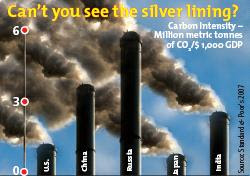IIPM Alliances
The
 expectations in the Wall Street about the financial results of Dell for the fourth quarter of this year were easily surpassed by the company which churned out revenue of $14.6 billion. Financial analysts had predicted the figures to be $13.95 billion or have per share income touching 26 cents but the company gave much higher returns per share at 34 cents. Dell has attributed the success to higher average selling prices that boosted its top line and that a senior leadership restructuring ‘to enhance accountability’ accounted majorly for its transformation. The company has also decided to globally bring down the headcount by almost 10% (9,000 employees). The last quarter’s performance stood at per share earnings of 33 cents on $14.22 billion revenue.
expectations in the Wall Street about the financial results of Dell for the fourth quarter of this year were easily surpassed by the company which churned out revenue of $14.6 billion. Financial analysts had predicted the figures to be $13.95 billion or have per share income touching 26 cents but the company gave much higher returns per share at 34 cents. Dell has attributed the success to higher average selling prices that boosted its top line and that a senior leadership restructuring ‘to enhance accountability’ accounted majorly for its transformation. The company has also decided to globally bring down the headcount by almost 10% (9,000 employees). The last quarter’s performance stood at per share earnings of 33 cents on $14.22 billion revenue.For Complete IIPM Article, Click on IIPM Article
Source : IIPM Editorial, 2007
An IIPM and Professor Arindam Chaudhuri (Renowned Management Guru and Economist) Initiative
For More IIPM Article, Visit Below....
IIPM going global
On "IIPM - Arindam Chaudhuri - Planman"
Warming up for doomsday?
If you have it, flaunt it
IIPM RANKED AHEAD OF FIVE OF THE IIMS
A beach resort… Come for a month, at least
IIPM ABOUT :- IIPM KNOWLEDGE CENTER
Money for nothing...
Topic: India – China: A Growth Comparison
Who says US is on the brink of a recession?...
Thanda karta sabko ek
IIPM Infrastructure : Campus



